The Western Digital Black PCIe SSD (512GB) Review
by Billy Tallis on March 8, 2017 8:30 AM ESTSequential Read Performance
The sequential read test requests 128kB blocks and tests queue depths ranging from 1 to 32. The queue depth is doubled every three minutes, for a total test duration of 18 minutes. The test spans the entire drive, and the drive is filled before the test begins. The primary score we report is an average of performances at queue depths 1, 2 and 4, as client usage typically consists mostly of low queue depth operations.
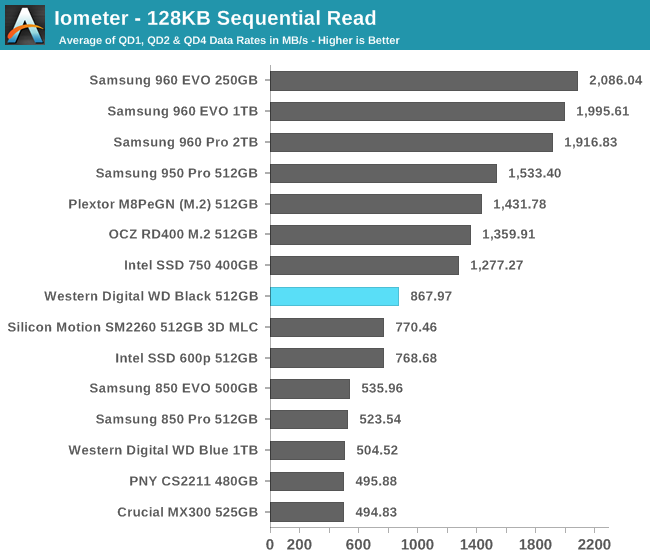
The sequential read speed of the WD Black beats the Silicon Motion SM2260 drives (both MLC and TLC), but the WD Black is otherwise way behind the rest of the PCIe SSDs.
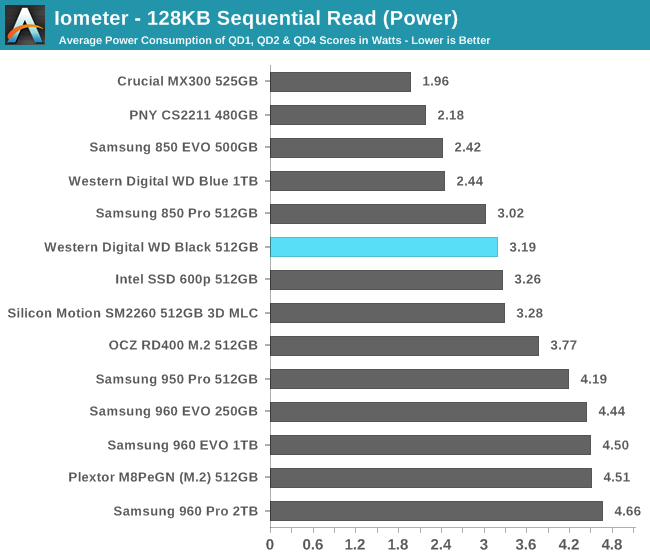
The WD Black has lower power draw than any other PCIe SSD during the sequential read test, and its efficiency is better than almost all other TLC drives (SATA or PCIe). However, the WD Black's efficiency is still about 60% worse than the Samsung 960 EVO.
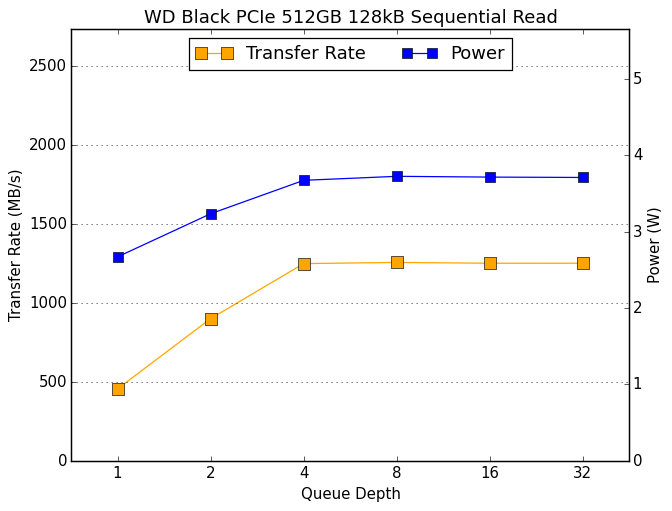 |
|||||||||
At QD 1 the WD Black is performing close to the limit of SATA, and it saturates by QD4 at almost 1.3GB/s. Power consumption never quite reaches 4W, so thermal throttling is very unlikely.
Sequential Write Performance
The sequential write test writes 128kB blocks and tests queue depths ranging from 1 to 32. The queue depth is doubled every three minutes, for a total test duration of 18 minutes. The test spans the entire drive, and the drive is filled before the test begins. The primary score we report is an average of performances at queue depths 1, 2 and 4, as client usage typically consists mostly of low queue depth operations.
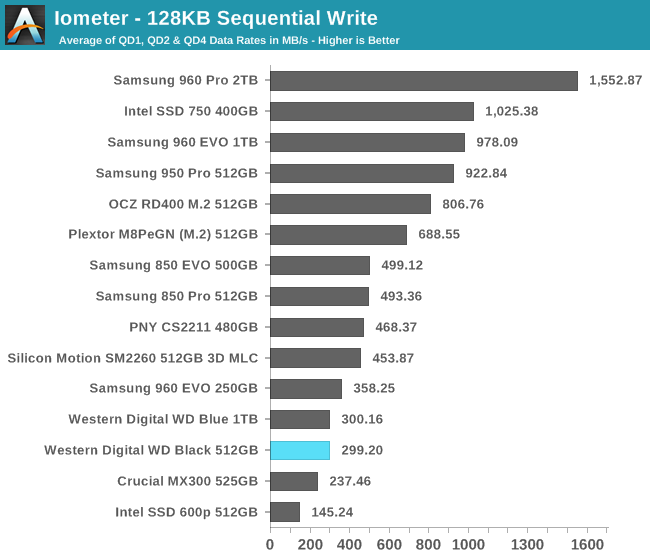
The sequential write speed of the WD Black is tied with the WD Blue and outperforms only the drives using IMFT 3D TLC. The Samsung 960 EVO and all of the MLC SSDs in this comparison sustain much better sequential write performance.
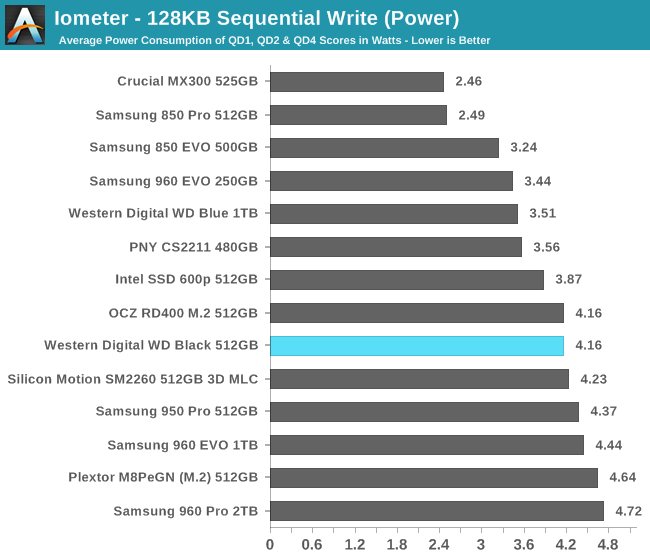
The WD Black's power consumption during the sequential write test is on par with other PCIe SSDs, giving it a typical efficiency for planar TLC SSDs. The WD Black is more efficient than the Intel 600p but loses quite badly to the other 3D TLC drives.
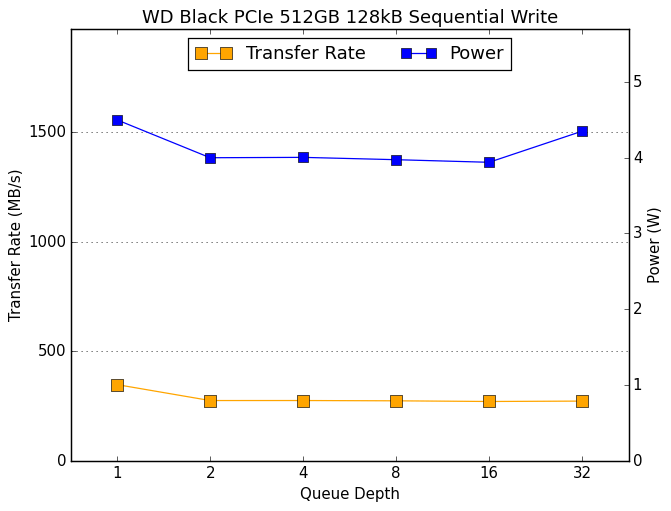 |
|||||||||
The WD Black hits steady state during the first phase of the test and power and performance remain the same for the rest of the test, except that power consumption jumps up a bit at the very end. At no point during this test does the WD Black's sequential write speed exceed what SATA SSDs are capable of.










36 Comments
View All Comments
Gothmoth - Wednesday, March 8, 2017 - link
why would anyone buy this?if you want M.2 you want performance.. this is just crap.
GoMoeJoe - Wednesday, March 8, 2017 - link
Price according to mediocre performance.Glad to see WD entering the space though.
WinterCharm - Wednesday, March 8, 2017 - link
Horrible price to performance ratio... if you're going to gimp reads this much on an M.2 SSD, then at least give us 1TB for $200.herbc - Wednesday, March 8, 2017 - link
Noticed top end SATA 2.5 inch SSD's jumped in price considerably lately. Samsung 850 Pro 256 GB went from $129.00 to around $150.00 in a week.Magichands8 - Wednesday, March 8, 2017 - link
Pretty much none of these SSDs are worth buying until the prices get down to around $0.12/GB and even then with a proper form factor. I suppose if you're particularly desperate or require them for some special niche use-case they will serve a purpose, ignorance not withstanding, but otherwise I just don't see the point.TheinsanegamerN - Thursday, March 9, 2017 - link
At 39c/GB, most people are already seeing that SSDs are far superior to HDDs for a majority of use cases.Jad77 - Wednesday, March 8, 2017 - link
It's Blue, not Black.Makaveli - Wednesday, March 8, 2017 - link
I don't get WD they may performance competitive drives in the spinning HD space. Yet when is comes to SSD's and M.2, NVMe drives they are happy with being bottom feeders!I guess its probably "a day late a dollor short" meaning it took them so long to enter the market everyone else was already so far ahead.
creed3020 - Thursday, March 9, 2017 - link
That has been WD's slogan and approach to SSD based storage for years. We've been saying for years that HDD's relevancy will continue to shrink and if these giants want to survive into tomorrow then they need to innovate, which this product is clearly not an example of. Its barely an also ran.CoreLogicCom - Wednesday, March 8, 2017 - link
They just don't want to cannibalize the last remnants of their consumer hard drive business by producing SSDs that are faster than their hard drives...?